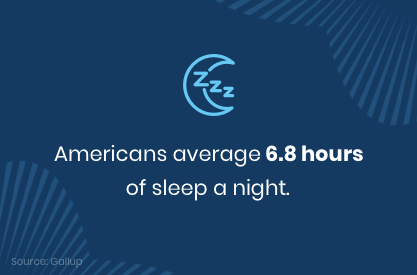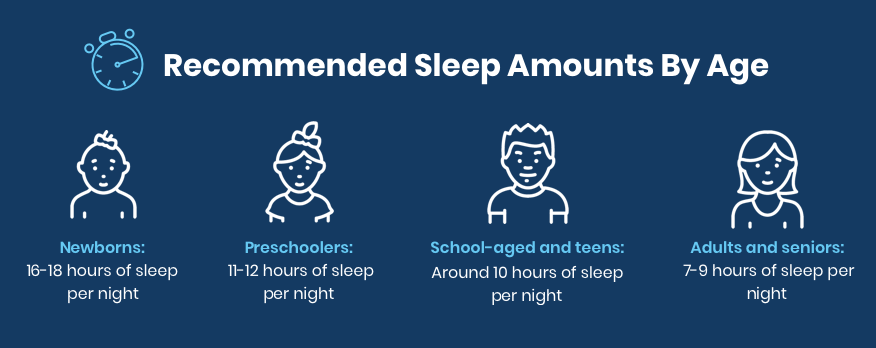Here are the Signs You’re Getting Too Much Sleep

Sleeping Too Much: Warning Signs of Getting Too Much Sleep
If you’re constantly oversleeping and feel excessively drowsy during the day, your excessive sleep habits might be caused by an underlying condition.
Occasionally sleeping in when you’re sick or tired from an extra stressful day of work isn’t concerning, but if you suddenly need to sleep for more than 10 hours every night, it might be time to take a deeper look into your sleep health. Continue reading for a full explanation of what too much sleep entails.
- Excessive Sleeping Warning Signs
- How Much Sleep is Too Much Sleep?
- Too Much Sleeping Causes: Why am I Sleeping Too Much?
- Optimal Amount of Sleep: 4 Tips To Give Your Body the Right Amount of Sleep
Excessive Sleeping Warning Signs
Sleep is important, but too much sleep on a regular basis isn’t doing you any favors. According to the National Sleep Foundation, excessive sleeping may lead you to experience the following symptoms:
- Productivity issues
- Low energy during the day
- Symptoms of anxiety
- Memory issues
- Extreme sleepiness unresolved by napping
- Extreme fatigue unaffected by how much you sleep
If you’re concerned about any excessive sleeping symptoms you’re experiencing, a sleep expert or your doctor can guide you toward a solution. A medical professional can help you determine if your excessive sleeping is caused by a sleep disorder or your sleep habits.

How Much Sleep is Too Much Sleep?
So how much is too much sleep? Well, it depends. Your sleep needs will vary over your lifetime, your sleep chronotype, age, activity level, general health, and lifestyle. The AASM recommends the following sleep amounts based on age that you can use as a general baseline:
- Newborns: 16-18 hours of sleep per night
- Preschoolers: 11-12 hours of sleep per night
- School-aged and teens: Around 10 hours of sleep per night
- Adults and seniors: 7-9 hours of sleep per night
Keep in mind that your personal sleep needs might deviate from the norm, but it doesn’t automatically mean that there’s an issue. If you’ve always been someone who needs a little extra sleep, then that doesn’t necessarily point to an underlying problem. Instead, look for sudden changes in your sleep schedule. Were you normally getting 7 hours of sleep and feeling fine, but now you need closer to 10 and feel terrible? If that’s the case, there may be an issue.
Likewise, there are often temporary causes of oversleeping, too. If you’re sick, you’re more likely to require some extra shuteye as your body tries to rest and build up the energy stores necessary to fight off an infection. Or, if you’ve run a marathon or experienced a high amount of acute stress, your body might naturally need more rest as a result to rebuild your brain and body. These one-off situations aren’t cause for concern.
Causes of Too Much Sleep: Why am I Sleeping So Much?

There are several underlying causes that may help explain why you’re sleeping for an excessive amount of time. If you feel concerned about your sleeping habits and your sleep duration is negatively affecting your waking life, it’s a good idea to consult with your physician who can better guide you to sustainable solutions and treatment if necessary.
The risks of sleeping too much and conditions linked to oversleeping include:
- Heart disease: Although researchers haven’t been able to pinpoint the reason for it, there is a strong correlation between oversleeping and the prevalence of heart disease.
- Depression: Around 40% of young people and 10% of older individuals with depression sleep too much, which can exacerbate depression symptoms.
- Headaches: If you’re prone to headaches, oversleeping can trigger pain.
- Obesity: Research suggests that habitual short and long sleep duration was a risk factor for developing obesity.
- Thyroid issues: Your hormones have a large impact on your sleep quality. If your thyroid’s production of certain hormones is too low, you might experience sleep issues like oversleeping due to constant exhaustion.
- Sleep apnea: When you suddenly need more sleep, your sleep quality might be declining. In response, your body keeps you asleep for longer to try and compensate for the poor quality. Sleep disorders like sleep apnea might be to blame.
- Diabetes: Both a lack of sleep and too much sleep can raise your risk for diabetes.
- Too much alcohol: Ingesting too much alcohol can easily encourage you to oversleep in addition to creating other sleep disturbances.
- Narcolepsy: This neurological sleep disorder affects your brain’s ability to appropriately control sleep and wake cycles.
- Hypersomnia: This is the medical condition diagnosed when your oversleeping tendency is chronic and has no known explanation.
- Medications: Some medications may make you feel more drowsy, causing you to sleep more. With that said, it’s important to never stop a medication suddenly unless you’re instructed to do so by a medical professional.
If you consistently feel like you’re oversleeping, or feel the need to oversleep to get the rest you need, it’s likely worth talking to your physician.While a select few of us really do require more sleep than most, if you are sleeping more than the recommended amount, a talk with your doctor is the best next step.

Optimal Amount of Sleep: 4 Tips To Give Your Body the Right Amount of Sleep
If you’re ready to take control over your sleep schedule, there are some tips you can incorporate before you hit the hay.
Tip #1: Keep napping to a minimum: If you can’t fall or stay asleep at night, the best napping advice is to keep napping to a minimum.
Tip #2: Use a sunlight alarm: If you tend to wake up feeling groggy, try a Sunlight alarm. Sunlight alarms work by gently illuminating your sleeping environment and provide you with the visual stimulation you need to wake you up more naturally. Exposing yourself to light in the morning can make you feel more alert and helps cement your body’s natural circadian rhythms.
Tip #3: Maintain a consistent sleep schedule: If it takes a long time to fall asleep, or it’s difficult to wake up on time, a sleep schedule could be helpful. Once you find the right amount of sleep that works for you, stick to it. Try to keep your bedtime and morning wake up time consistent, even on the weekends and during vacation.
Tip #4: Track your sleep: If you want to get insights into your sleep, use a sleep diary to track your wake-up time and bedtime, or try a sleep tracker like SleepScore or SleepScore Max. Make sure to note any lifestyle variables, too, like drinking alcohol or going for a longer run than usual. Keep track of your sleep for at least a week before making a doctor’s appointment.
Although oversleeping isn’t talked about as much as insomnia, it’s important to recognize when this occasional problem becomes a chronic issue. By changing your lifestyle, sleep habits or working in tandem with your doctor, you can enjoy a more restful and timely sleep.
